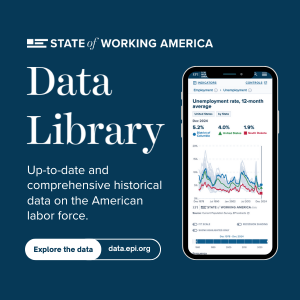By repealing paid sick leave, Missouri legislators will hurt working families
Late last Wednesday night, the Missouri Republican-controlled legislature overrode the will of the state’s voters by repealing the paid sick leave portion of Proposition A, a ballot measure passed with 58% support in the 2024 election. This short-sighted decision is a step backward for Missouri’s working families and a violation of the democratic process.
Workers will briefly enjoy the benefits of paid sick leave before it is taken away. On May 1, workers started earning one hour of paid sick leave for every 30 hours worked, and they will continue to accrue leave until the repeal takes effect on August 28. Within this period, someone working a full-time schedule would have earned 24 hours of sick leave. It is not immediately clear if those hours will be available for a worker’s use after August 28. Additionally, the legislation also amends the part of Proposition A that raised the minimum wage to $15 an hour and indexed it to inflation. While the minimum wage will remain at $15 an hour (where it has been since January 1), it will no longer be indexed to inflation—meaning inflation will eat away at the value of the state minimum wage in future years unless lawmakers (or voters) take action.
This legislation will cause meaningful harm to working families in Missouri. The Missouri Budget Project estimated that 728,000 Missouri private-sector workers did not have paid sick leave prior to the passage of Proposition A. Workers without paid sick days are mostly working in low-wage jobs, and Black and Hispanic workers are disproportionately overrepresented in the low-wage workforce.
The lack of paid sick leave erodes working families’ economic security and needlessly spreads illness. As EPI noted earlier this year, paid sick leave laws improve public health by reducing the spread of illness, and their costs to businesses are extremely modest—generally requiring no measurable change to business practices. Paid sick leave reduces job separation rates among women, which is good for family stability and suggests paid leave creates a more level playing field for all workers. EPI reports that “paid sick leave policies allow workers to not only maintain their employment but also add work hours, suggesting that such policies function as work support for workers earning low wages.”
This is not the first time Missouri’s legislature has rolled back benefits for workers that were already in place. In 2017, legislators undid St Louis’s local minimum wage, which had been set at $10 an hour, meaning the minimum wage reverted to the state minimum of $7.70 an hour after four months. Additionally, in 2021, Missouri legislators tried to block a voter-approved expansion of Medicaid only to be blocked by a judge.
The Missouri legislature’s repeated efforts to thwart the clearly expressed will of the voters is an example of the increasingly common practice of GOP-led states attempting to limit the capacity of voters to enact pro-worker changes through ballot measures. This follows a slew of progressive policy measures passed by referendum in 2024, including minimum wage increases and paid sick leave measures in Alaska and Missouri, expanded abortion rights in seven states (also including Missouri), and rejections of school vouchers in Colorado, Kentucky, and Nebraska.
This decision is a slap in the face to the 1.7 million Missourians who voted for the ballot measure in November 2024, and to all working families in the state. It is bad policy that will harm Missourians, provide no help to businesses, and further demonstrate that the Missouri legislature is not enacting policies that support working people’s interests.
Enjoyed this post?
Sign up for EPI's newsletter so you never miss our research and insights on ways to make the economy work better for everyone.
